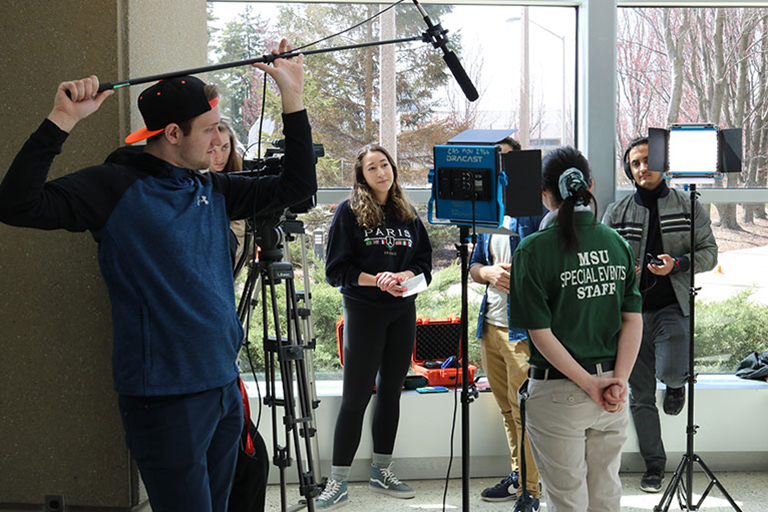In a historic move, the MSU School of Journalism will offer a new Bachelor of Arts in Digital Storytelling beginning in fall semester 2021. The new major will prepare students to work in a media-focused world, providing valuable education, training, and experience for a multitude of career paths.
“Visual and verbal storytelling skills are needed pretty much everywhere these days, so this new major creates new career pathways for the digital age,” said Professor Tim Vos, Director of the MSU School of Journalism.
The Digital Storytelling Major offers an interdisciplinary focus with courses from Film Studies, Journalism, Media and Information, and more in the College of Communication Arts and Sciences.
The courses offered cover a broad range of subjects, such as film history and theory; writing, screenwriting, and storytelling; podcasting; creating fiction films; and documentary filmmaking. Students can also choose from many courses that cover the technical aspects of digital storytelling, including production, sound design, motion and stop motion, video editing, scoring, stage lighting, and camera techniques.
Students in the program will study a common core in digital storytelling, learning the world of media and the foundations for creating story, sound, and motion. The program will provide them with the tools and techniques they need for creative, entrepreneurial, and analytical process, as well as media production. Students can also cater the degree to their chosen interests, selecting from one of many concentrations and minors.
The innovative academic program offers students the common core, along with a 15-credit minor or one of the following concentrations:
- The Animation Concentration focuses on the production and theory of animated works in storytelling.
- The Audio Storytelling Concentration focuses on storytelling through the art and science of production with audio.
- The Filmmaking Concentration focuses on filmmaking for both fiction and non-fiction.
- The Multicam Production Concentration focuses on media production using industry multi-camera approaches.
- The Minor in Documentary Production educates students in the history, theory, and production of documentary media.
- The Minor in Fiction Filmmaking educates students. in the history, theory, and production of fiction film.
“This is historic for the School of Journalism,” said Vos. “It’ll be the first time we offer a major other than journalism. But, it’s the right time and the right way for us to do this.”
The new major is a reimagining of a program that was previously housed in the Department of Media and Information. Faculty at the College of Communication Arts and Sciences worked together to create the unique, interdisciplinary program.
“It makes sense that we’ve joined forces,” said Vos. “We share a commitment to storytelling that examines the human experience and seeks to be a source of understanding in the world.”
Drawing upon the expertise and experience of celebrated journalists and filmmakers, the major will offer students a world-class education in digital storytelling. Graduates of the program may go on to work in film, television, corporate communications, digital advertising or new media.
“We’ve already welcomed the six new faculty who have built the new major. Each one is an amazing professional and inspiring instructor,” said Vos. “The curriculum is top rate. We’re confident that we can offer a top-of-the-line educational experience.”
By Melissa Priebe
